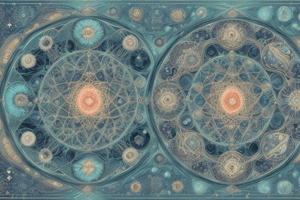Podcast
Questions and Answers
What does John Polkinghorne suggest about questions arising from science?
What does John Polkinghorne suggest about questions arising from science?
- They are strictly subjective in nature.
- They are fundamentally scientific questions.
- They can be answered using scientific methods.
- They transcend the scope of science. (correct)
Why does the text state that genuine boundary questions cannot arise from science?
Why does the text state that genuine boundary questions cannot arise from science?
- Science is limited to empirical investigations. (correct)
- Boundary questions require scientific methods.
- All questions must be scientifically validated.
- Scientists are not allowed to ponder such questions.
What does Ian Barbour imply about the relationship between science and religion?
What does Ian Barbour imply about the relationship between science and religion?
- They are inherently contradictory.
- Philosophy plays a crucial role in understanding their connection. (correct)
- Science and religion must be studied in isolation.
- Both rely solely on empirical evidence.
According to the discussion, what can be considered a good partner in the dialogue between science and religion?
According to the discussion, what can be considered a good partner in the dialogue between science and religion?
What role does philosophy play in the context of science and religion as per the content?
What role does philosophy play in the context of science and religion as per the content?
What aspect of epistemology is particularly relevant in the context discussed?
What aspect of epistemology is particularly relevant in the context discussed?
How do personal reflections of scientists on metaphysical questions relate to their work?
How do personal reflections of scientists on metaphysical questions relate to their work?
What type of questions does the content suggest cannot be answered by science?
What type of questions does the content suggest cannot be answered by science?
What is the basis of Aristotle's understanding of knowledge?
What is the basis of Aristotle's understanding of knowledge?
What did Aristotle conclude about the nature of things?
What did Aristotle conclude about the nature of things?
Which of the following is NOT one of Aristotle's four causes?
Which of the following is NOT one of Aristotle's four causes?
What was the significance of the Immobile Motor in Aristotle's philosophy?
What was the significance of the Immobile Motor in Aristotle's philosophy?
What shift occurred in the understanding of philosophy and theology during the Middle Ages?
What shift occurred in the understanding of philosophy and theology during the Middle Ages?
Who is associated with the emergence of the first universities during the Middle Ages?
Who is associated with the emergence of the first universities during the Middle Ages?
What was a key idea that emerged from St. Thomas Aquinas's philosophical method?
What was a key idea that emerged from St. Thomas Aquinas's philosophical method?
How did the relationship between philosophy and theology change in the late Middle Ages?
How did the relationship between philosophy and theology change in the late Middle Ages?
What distinguishes the Big Bang model from other scientific models?
What distinguishes the Big Bang model from other scientific models?
Which question does not fall within the realm of scientific inquiry according to the content?
Which question does not fall within the realm of scientific inquiry according to the content?
What is implied by the statement that the universe needs an explanation 'outside' of itself?
What is implied by the statement that the universe needs an explanation 'outside' of itself?
How is the concept of 'self-creation' viewed in the context provided?
How is the concept of 'self-creation' viewed in the context provided?
According to the content, what role does philosophy and theology play in understanding existence?
According to the content, what role does philosophy and theology play in understanding existence?
What is suggested as the necessary cause of the universe within the context provided?
What is suggested as the necessary cause of the universe within the context provided?
What does the phrase 'ultimate reason for existence' imply?
What does the phrase 'ultimate reason for existence' imply?
How is the advancement of science characterized in the content?
How is the advancement of science characterized in the content?
Flashcards
Boundary Questions
Boundary Questions
Questions that arise from science but cannot be answered by science itself.
Science's limitations
Science's limitations
John Polkinghorne's idea that science, while generating questions, cannot answer those about ultimate meaning or the nature of reality.
Non-scientific questions
Non-scientific questions
Not strictly scientific, although arising from science.
Subjective connections
Subjective connections
Signup and view all the flashcards
Philosophy's role
Philosophy's role
Signup and view all the flashcards
Philosophy's contribution
Philosophy's contribution
Signup and view all the flashcards
Science's approach
Science's approach
Signup and view all the flashcards
Theology's approach
Theology's approach
Signup and view all the flashcards
Teleology
Teleology
Signup and view all the flashcards
Aristotle's Four Causes
Aristotle's Four Causes
Signup and view all the flashcards
Immovable Motor
Immovable Motor
Signup and view all the flashcards
Philosophy and Theology in the Middle Ages
Philosophy and Theology in the Middle Ages
Signup and view all the flashcards
Distinction to Separation
Distinction to Separation
Signup and view all the flashcards
Aristotle's Scientific Approach
Aristotle's Scientific Approach
Signup and view all the flashcards
Aristotle's View of Nature
Aristotle's View of Nature
Signup and view all the flashcards
Aristotle's Concept of Prime Mover
Aristotle's Concept of Prime Mover
Signup and view all the flashcards
Ultimate Reason for Existence
Ultimate Reason for Existence
Signup and view all the flashcards
Radical Question
Radical Question
Signup and view all the flashcards
Necessary Cause
Necessary Cause
Signup and view all the flashcards
Metaphysics
Metaphysics
Signup and view all the flashcards
Self-Creation Paradox
Self-Creation Paradox
Signup and view all the flashcards
Creation ex Nihilo
Creation ex Nihilo
Signup and view all the flashcards
Causality
Causality
Signup and view all the flashcards
Non-Scientific Explanation
Non-Scientific Explanation
Signup and view all the flashcards
Study Notes
Historical Retrospective of Knowledge
- Science in Ancient Greece (Aristotle): Knowledge based on empirical observation; natural objects follow patterns; teleological view—nature has inherent goals.
- Four causes: Material (matter), Formal (form), Efficient (doer), Final (purpose).
- Prime Mover: An unmoved, incorporeal entity, the cause for existence and maintenance.
- Middle Ages (St. Thomas Aquinas): Philosophy as a means of explaining theological questions; philosophy and theology as two distinct steps in understanding.
- Late Middle Ages: Separation of knowledge fields.
Science in the Modern Age (Newton)
- Rise of modern science (16th century) emphasizing scientific method, mathematical formalization of sciences, and empirical evidence.
- Distinction of science types: natural, human, and philosophical.
- Shift from "reality" to "method" as the main criterion for knowledge.
Science-Philosophy-Theology Relationship
- The relationship between science, philosophy, and theology is broken (shift in paradigm).
- Rationalism (Descartes): Knowledge from clear and distinct ideas, mathematical truth.
- Empiricism (Bacon): Knowledge from sensory experience, data-driven approach.
- Positivism (Comte): Knowledge from experience; belief that only science provides valid knowledge (scientific materialism). Rejected mythological and metaphysical explanations.
Activity: Positivism and Scientism
- Investigate whether positivism and scientism are scientific theories.
- Analyze the contradictions or inconsistencies within these philosophies.
Science and Religion
- Activity: Stephen Hawking advocates for the idea that physics can explain the universe.
- Questions: Can physics answer the existence of God? and why?
- Natural explanations: Physical laws, Big Bang model, natural transformations
- "Self-creation": Contradictory concept; physical laws are not responsible for ultimate reason of existence.
- Discussion concerning science's capability to fully explain the universe's existence.
- Theological explanations: Ultimate reason for existence; existence of a necessary cause beyond physical laws, represented by God.
Methodological and philosophical approaches
- Activity: "Verification" in experimental method
- Falsificationism (Popper) : Knowledge advances by rejecting theories that fail empirical tests, not through confirmation; single negative result suffices to disprove theory.
- Philosophical presuppositions: (Ontology—real world has natural order, Epistemology—world and order are cognizable, Ethical—scientific activity is valuable).
Criteria of Truth
- Tradition, Authority, Logical Coherence, Verifiability, Utility, Evidence.
- Hermeneutic Circle: rejecting a belief may require rejecting many other beliefs.
Synthesis and Analysis: Existence of the Soul
- Activity: Analyze if it is possible to prove the existence of the soul (immaterial).
- Examine related studies and experiments regarding the existence of a soul.
- Determine whether studies support existence of a soul, or if phenomena are explicable by the brain and other physical processes.
Fundamentals of Experimental Method
- Observation: Physical phenomena.
- Hypothesis: Possible explanation.
- Experimentation: Testing hypotheses.
- Formalization: Laws and theories in a language (mathematics),
- Publicity: Observations and experiments are public and accessible.
Studying That Suits You
Use AI to generate personalized quizzes and flashcards to suit your learning preferences.



